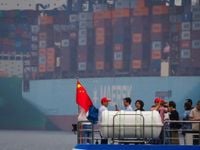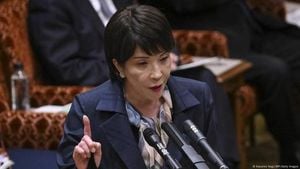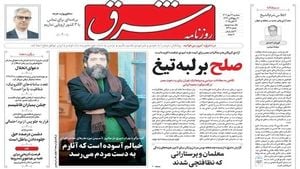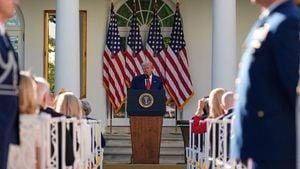As trade tensions escalate, Chinese exporters are ramping up their strategies to evade the hefty tariffs imposed by the U.S. administration under former President Donald Trump. Reports indicate that these exporters are increasingly routing their shipments through third countries to obscure their true origins, a tactic commonly referred to as "country hopping" or "washing products." This practice not only raises concerns among neighboring countries but also highlights the lengths to which Chinese businesses will go to maintain access to the crucial U.S. market.
According to the Financial Times, advertisements promoting methods for "beautifying the origin country" are rampant on Chinese social media platforms. These advertisements suggest ways to manipulate the origin labels of goods, thereby allowing them to bypass the stringent tariffs that can reach as high as 145%. The growing use of such tactics underscores the fears of exporters who worry that the tariffs could significantly cut them off from one of their most important markets.
Sara Au, a seller at Baitai Lighting, a company based in Zhongshan, southern China, explained the current predicament: "The tariffs are extremely high, but we can sell components to neighboring countries, and then they sell them to the United States, which reduces the tariff burden." This method relies heavily on the U.S. trade regulations that require goods to undergo substantial transformation in another country to be classified as products of that nation.
In practical terms, this means that goods shipped to countries like Malaysia can be repackaged and relabeled before being sent to the U.S. One logistics representative stated, "We can ship goods to Klang, Malaysia, where they are transferred to local containers and rebranded. Once they leave Malaysia, it’s not our concern anymore." This approach minimizes legal risks for the exporters, as they can claim they are not responsible for the products once they leave the port.
Moreover, social media platforms such as Xiaohongshu are flooded with advertisements offering assistance in shipping goods to Malaysia, where new certificates of origin can be issued before the goods are exported to the U.S. One promotional post read, "The U.S. has imposed restrictions on Chinese wooden flooring and tableware? (Wash the origin) in Malaysia for a smooth customs clearance." This alarming trend reflects the growing complexity of international trade in the face of rising tariffs.
Experts note that the method of "country hopping" is just one of two primary strategies employed by exporters to circumvent U.S. tariffs. The second method involves mixing high-value goods with cheaper items, allowing exporters to falsely declare a lower total cost for their shipments. This tactic not only complicates the verification process for customs officials but also raises questions about the integrity of the global supply chain.
In response to these developments, the Malaysian Ministry of Investment, Trade, and Industry has reiterated its commitment to maintaining the integrity of international trade practices. The ministry emphasized that any attempts to circumvent tariffs through false or misleading declarations are considered serious offenses. "If these reports are verified, we will investigate and take appropriate action in cooperation with our customs and U.S. authorities," they stated.
The situation is further complicated by the actions of other countries in the region. The South Korean Customs Service recently reported seizing $29.5 million worth of foreign products falsely labeled as South Korean goods in the first quarter of this year. The majority of these products originated in China and were intended for the U.S. market. The agency noted a significant uptick in instances where South Korea is being used as a transit point to reroute products and avoid tariffs due to changes in U.S. trade policy.
"We are witnessing a sharp increase in cases where our country is being used as a backdoor for importing products to avoid tariffs and various restrictions," a spokesperson for the South Korean Customs Service remarked. They have uncovered numerous instances where Chinese products were misrepresented as Korean, further complicating the international trade landscape.
In Vietnam, the Ministry of Industry and Trade has called upon local trade associations, exporters, and manufacturers to tighten their verification processes regarding the origins of raw materials and imported goods to prevent the issuance of forged certificates. Similarly, Thailand's Ministry of Foreign Trade has announced measures to enhance checks on the origins of products destined for the U.S. to prevent tariff evasion.
As the trade war continues to evolve, the implications for global commerce are significant. The tactics employed by Chinese exporters to circumvent tariffs not only affect the economic landscape of the U.S. but also challenge the integrity of international trade practices. Countries that serve as transit points are now grappling with the potential fallout from these deceptive practices, which could lead to strained diplomatic relations and economic repercussions.
Overall, the ongoing battle over tariffs and trade practices highlights the complexities of modern commerce in a globalized world. As nations strive to protect their economic interests, the strategies employed by exporters will continue to adapt, leading to an ever-changing landscape of international trade.




